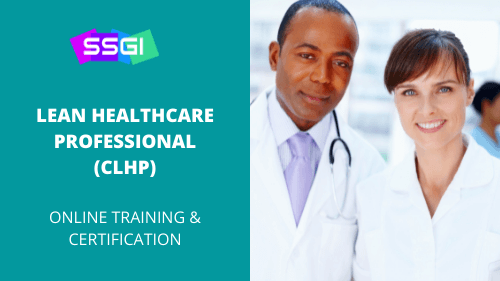SIX SIGMA CERTIFICATION IN Healthcare: Overview, Benefits & Career Impact
Lean Six Sigma is transforming healthcare operations by improving patient outcomes, reducing delays and streamlining operations.

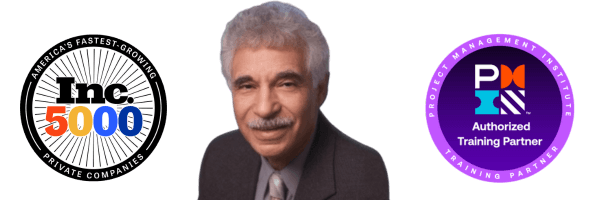
Dr. Barry Shore, McGraw-Hill Award Winning Professor
SSGI is a recognized leader in Six Sigma certification, trusted by healthcare organizations and Fortune 500 companies. As a Baldrige Foundation Partner, an Inc. 5000 company, and a PMI ATP, we set the standard for quality and industry recognition.
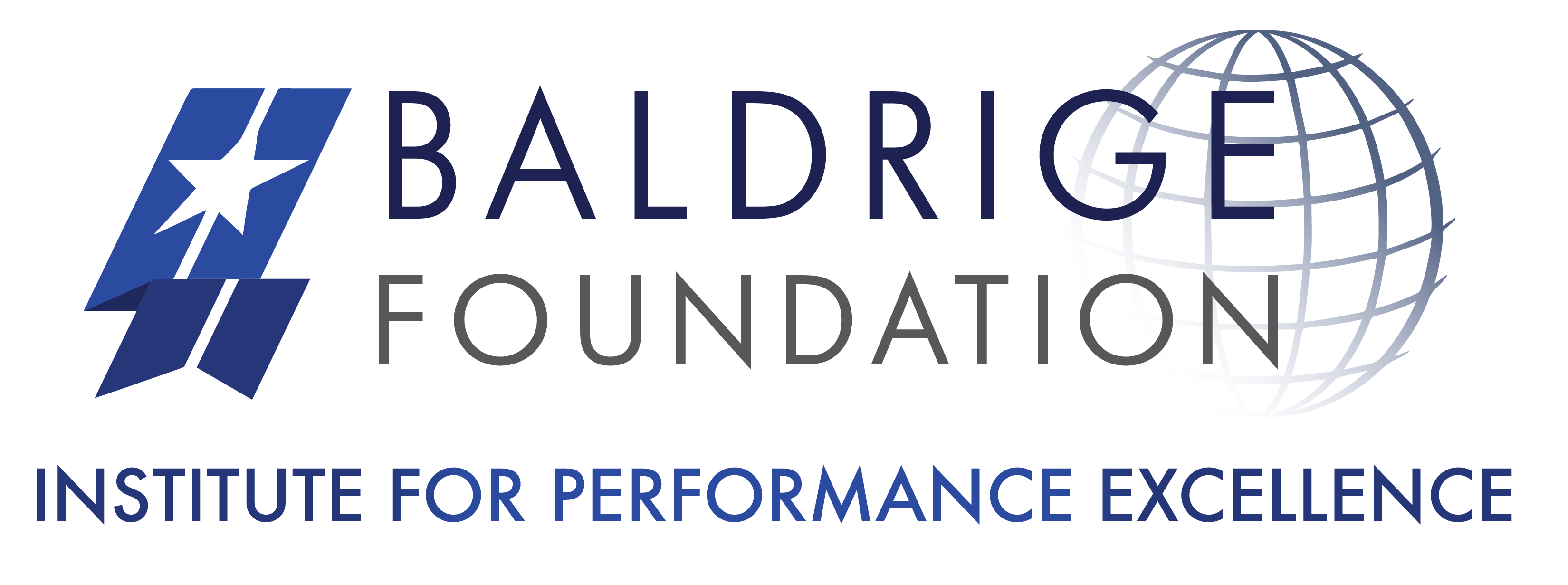
Why Healthcare Professionals Choose Lean Six Sigma
Whether you’re working in clinical operations, patient access, administration, or quality improvement, Lean Six Sigma training gives you the skills to:
- Identify inefficiencies in patient flow, scheduling, or resource use
- Reduce wait times and delays in diagnostics or care delivery
- Improve care coordination and eliminate bottlenecks across departments
- Enhance patient satisfaction and safety metrics
- Support value-based care and compliance goals
- Optimizing staff scheduling and shift planning
- Eliminating errors in billing or documentation
From nurses to administrators to executive leaders, Lean Six Sigma empowers healthcare teams to tackle complex challenges with a structured, data-driven approach.
Lean Six Sigma in healthcare
SSGI is trusted by healthcare organizations globally to deliver measurable results through Lean Six Sigma training and certification.
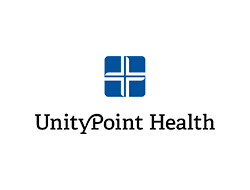





Top Reasons Why You Should Get Six Sigma Certification in Healthcare
Increase Career & Salary Potential
Six Sigma-certified professionals are in high demand across the healthcare sector. With growing emphasis on quality care, operational efficiency, and cost control, certified professionals are well-positioned for leadership roles in clinical operations, quality management, and healthcare administration. Salaries for Black Belt-certified professionals regularly exceed $95K+, especially in management and consulting roles within hospitals, health systems, and insurance organizations.
Improve Quality
Healthcare institutions rely on process efficiency to improve patient outcomes and manage limited resources effectively. Six Sigma methodologies help eliminate errors, optimize workflows, and ensure consistent, high-quality service delivery throughout the care continuum. From emergency departments to administrative billing systems, Lean Six Sigma drives measurable performance gains.
Cut Cost & Reduce Waste
Inefficiencies in healthcare lead to longer wait times, staff burnout, increased costs, and compromised outcomes. Six Sigma reduces variability, streamlines clinical and administrative processes, and helps healthcare teams allocate resources more effectively — resulting in better care delivery and significant financial impact.
Strengthen Leadership & Culture
Organizations that implement Six Sigma foster a data-driven, problem-solving mindset among staff. This methodology empowers teams to make strategic, evidence-based decisions and drive lasting improvements in clinical quality, workflow efficiency, and patient experience.
Improve Customer Satisfaction
Healthcare providers serve thousands to millions of patients annually, making process efficiency essential for both safety and satisfaction. Six Sigma helps reduce medical errors, improve response times, and enhance communication — earning trust from patients, staff, and stakeholders.
Six Sigma Certification in Healthcare: Job Opportunities & Salary Insights
Six Sigma-certified professionals are highly valued across the healthcare industry. With patient outcomes, efficiency, and cost reduction being top priorities, healthcare organizations actively seek Six Sigma experts for process improvement roles. Certified professionals work in departments such as patient access, clinical operations, quality assurance, and hospital administration — improving service delivery and organizational performance.
As an official Baldrige Foundation partner, the organization behind the Malcolm Baldrige National Quality Award, presented annually by the President of the United States, SSGI’s certifications align with the highest standards of performance excellence and healthcare improvement.
Our Six Sigma training has been trusted by major healthcare institutions, including Brigham and Women’s Hospital, the University of Southern California, and other leaders in health systems and medical education.

Who Hires Six Sigma-Certified Professionals in Healthcare?
Healthcare organizations across the country are actively hiring Six Sigma-certified professionals to lead operational excellence and quality improvement initiatives. These include:
✔ Large Integrated Health Networks & Hospital Systems:
Reducing costs, enhancing patient safety, and improving systemwide coordination.
✔ Insurance Providers and Public Health Agencies:
Driving efficiency in claims, compliance, and care delivery models.
✔ Veterans Health Administration (VA):
Streamlining patient services and administrative processes.
Overview of Six Sigma Certification in Healthcare
Healthcare organizations operate in complex, high-stakes environments where structured problem-solving and data-driven decision-making are essential. Six Sigma certification equips professionals at all levels with the skills to enhance efficiency, improve patient outcomes, reduce costs, and drive meaningful operational improvements.
At SSGI, we offer a full range of Lean Six Sigma certification programs tailored for healthcare professionals. Whether you’re on the clinical front lines or leading administrative initiatives, our programs are designed to provide practical, industry-recognized training that fits your real-world challenges.

Six Sigma Certification in Healthcare Levels
Six Sigma certification in healthcare follows a tiered approach, similar to martial arts rankings, ranging from foundational to advanced expertise. Each level is designed to help professionals progressively build skills and take on increasing leadership roles:
🟡 Yellow Belt – Ideal for beginners.
🟢 Green Belt – Designed for mid-level professionals.
⚫ Black Belt – For healthcare leaders.
🏆 Master Black Belt – The highest level, for experts.
Yellow Belt Certification for Healthcare Professionals
Best for: Clinical coordinators, patient access professionals, and healthcare staff involved in frontline improvement efforts.
Overview: The Yellow Belt certification provides foundational training in Lean Six Sigma, helping healthcare professionals identify inefficiencies and support process improvement initiatives across clinical and administrative settings.
✅ Gain introductory training in Lean Six Sigma principles
✅ Learn to identify waste and inefficiencies in patient care processes
✅ Support Green and Black Belts in healthcare quality improvement projects
Green Belt Certification for Healthcare Professionals
Best for: Clinical operations managers, quality improvement leads, and mid-level professionals driving process change.
Overview: The Green Belt certification prepares healthcare professionals to lead moderate-scale Six Sigma projects within hospitals, clinics, and administrative departments. Green Belts collaborate with Black Belts to implement data-driven improvements in care delivery and operational efficiency.
✅ Learn how to apply Six Sigma in healthcare departments and systems
✅ Gain skills in project management and statistical analysis
✅ Lead improvement initiatives to reduce delays, costs, and inefficiencies
Black Belt Certification for Healthcare Professionals
Best for: Healthcare quality directors, department heads, and professionals seeking leadership roles in performance improvement.
Overview: Black Belt-certified professionals lead high-impact process improvement initiatives across healthcare systems. This certification is ideal for those looking to manage cross-functional teams, implement advanced analytics, and drive strategic change in clinical or administrative settings.
✅ Master data-driven decision-making techniques
✅ Lead complex healthcare process improvement initiatives
✅ Implement cost-reduction and quality enhancement strategies at the organizational level
Master Black Belt Certification for Healthcare Professionals
Best for: Senior healthcare executives, directors of quality, and leaders responsible for enterprise-wide performance programs.
Overview: The Master Black Belt certification is the highest level of Lean Six Sigma expertise. It equips professionals with the strategic, coaching, and analytical skills required to lead large-scale improvement programs and mentor Six Sigma teams across complex healthcare systems.
✅ Coach and mentor Yellow, Green, and Black Belts in healthcare organizations
✅ Design and oversee hospital- or system-wide improvement strategies
✅ Drive long-term cost savings, compliance, and clinical quality outcomes
Lean Healthcare Certification
Best for: Healthcare professionals focused on quality improvement, care coordination, and operational excellence across clinical and administrative functions.
Overview: The CLHP certification is designed specifically for healthcare professionals seeking practical Lean training focused on real-world hospital and clinical settings. This course combines key Lean tools and strategies with healthcare-specific examples to help reduce delays, improve quality, and enhance patient experience.
✅ Apply Lean principles to eliminate inefficiencies in healthcare workflows
✅ Improve cross-departmental coordination and care transitions
✅ Lead initiatives to enhance patient satisfaction, reduce costs, and support regulatory compliance
Why Thousands of Healthcare Professionals Choose SSGI for Six Sigma Certification
For nearly a decade, SSGI has been the trusted choice for Six Sigma certification among healthcare organizations, Fortune 500 companies, and professionals worldwide. Here’s why hospitals, clinics, insurance providers, and public health agencies rely on SSGI for process improvement training.
Best Value for Industry-Leading Training
SSGI provides all-inclusive pricing with no surprise fees for exams, retakes, or certification renewals. Plus, our training is developed by Dr. Barry Shore, a McGraw-Hill award-winning professor.
Accredited by PMI, SHRM, and CPD
SSGI certifications meet the highest industry standards, ensuring global recognition for professionals in government and corporate sectors. Also earn professional credits like PDUs and CEUs.
Trusted by Healthcare Organizations & The Fortune 500
Our clients include the likes of Unity Health, Humana, Mass General Brigham, University of Southern California, Florida Health and many other leading healthcare agencies across North America.
Certifications That Never Expire
Once certified with SSGI, your credential lasts for life—no renewal fees, no expiration, and no hidden costs.
100,000+ Certified Professionals & $500M in Cost Savings
SSGI graduates have successfully led cost-cutting, process optimization, and efficiency-improving initiatives, generating over $500M in savings for organizations worldwide.
Dr. Barry Shore | Expert Instructor
Dr. Barry Shore, a globally recognized expert in operations management, brings over 40 years of experience to Lean Six Sigma training. As a McGraw-Hill award-winning author and professor emeritus, his groundbreaking work has empowered professionals from Fortune 500 companies, government agencies, and leading organizations worldwide.

Industry Recognized Accreditations | Baldrige Foundation Partner | #1 in Process Improvement for Healthcare Organizations
![]()
Six Sigma vs. Lean Six Sigma in Healthcare: What’s the Difference?
While the terms “Six Sigma” and “Lean Six Sigma” are often used interchangeably, there are some key distinctions, especially in healthcare.
Six Sigma focuses on reducing variation and defects using statistical analysis and the DMAIC framework.
Lean emphasizes eliminating waste and improving flow, often by streamlining inefficient processes.
Lean Six Sigma combines both approaches — making it highly effective for healthcare environments where improving quality, efficiency, and patient outcomes must go hand in hand.
At SSGI, all of our programs are built on the Lean Six Sigma methodology. This means healthcare professionals gain practical tools to reduce delays, eliminate unnecessary steps, and drive measurable results — all while maintaining high levels of safety and compliance.
What Our Clients Say About SSGI

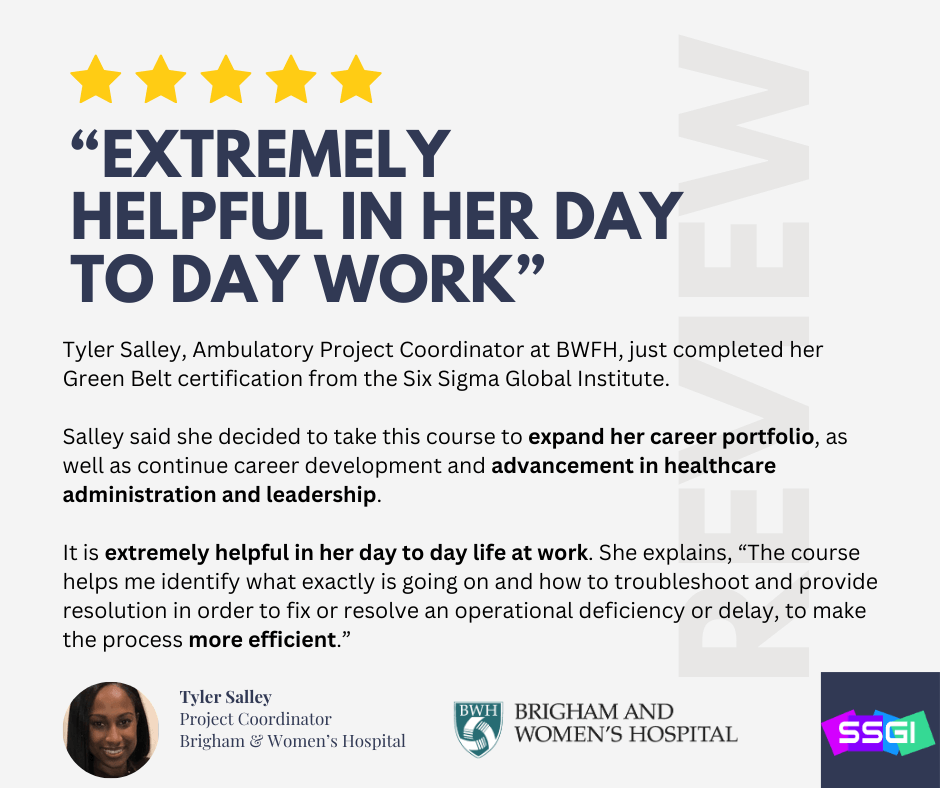
Lean Six Sigma in Healthcare FAQs
What is Lean Six Sigma in healthcare?
Lean Six Sigma in healthcare is a methodology that combines Lean principles and Six Sigma tools to improve patient care, reduce waste, and enhance operational efficiency across clinical and administrative processes.
What are the benefits of Lean Six Sigma in healthcare?
Lean Six Sigma helps healthcare organizations reduce medical errors, shorten patient wait times, improve care quality, lower costs, and streamline workflows by eliminating inefficiencies and using data-driven decision-making.
Is Lean Six Sigma certification useful for healthcare professionals?
Yes, Lean Six Sigma certification is highly valuable for healthcare professionals. It demonstrates process improvement skills, leadership potential, and the ability to drive better outcomes in clinical and non-clinical roles.
What jobs can you get with a Lean Six Sigma healthcare certification?
Professionals with Lean Six Sigma healthcare certification can pursue roles such as quality improvement specialist, healthcare project manager, process improvement consultant, clinical operations manager, or Lean coordinator.
How long does it take to complete Lean Six Sigma certification for healthcare?
Most Lean Six Sigma healthcare certifications can be completed in 2 to 8 weeks, depending on the belt level and program format. Self-paced online courses often allow faster completion.
Which Six Sigma Belt should I take for healthcare?
Healthcare professionals new to Lean Six Sigma often start with the Yellow or Green Belt. Green Belt is ideal for those involved in managing or leading improvement projects. Black Belt is suited for advanced roles in quality or operations leadership.
Do hospitals use Lean Six Sigma?
Yes, many hospitals and healthcare systems use Lean Six Sigma to improve patient outcomes, reduce costs, eliminate errors, and streamline care delivery. It’s widely adopted in both clinical and administrative departments.
What’s the difference between Six Sigma and Lean in healthcare?
Six Sigma focuses on reducing variation and improving quality through data analysis, while Lean emphasizes eliminating waste and increasing efficiency. In healthcare, both are often combined to optimize patient care and operations.
Can Lean Six Sigma be used in clinical settings?
Yes, Lean Six Sigma can be effectively applied in clinical settings to reduce medication errors, improve patient flow, enhance safety protocols, and standardize care processes based on evidence and performance data.





